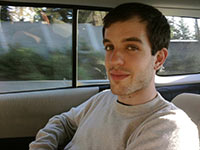
Colin Chapman '11
Fulbright U.S. Student Program
I graduated in December 2010 with a degree in psychology. While at Reed I worked as a tutor and teaching assistant in the Psychology Department. I spent much of my junior and senior years conducting neuroscience research with Professor Paul Currie, the majority of which was focused on the neural circuitry underlying eating behavior. Beginning in August 2011, I will be continuing my research on eating behavior with Dr. Helgi Schioth in his lab at Uppsala University in Sweden. More specifically, we will be investigating a specific transporter in the hypothalamus to see if it may be partially responsible for cravings for highly palatable food, and in turn obesity. My hope is that my research will contribute meaningfully to the search for a pharmacological treatment for obesity, which is possibly the most serious and ubiquitous health concern we face as a species.
On November 15, 2012, he wrote:
My experience in Sweden was eye-opening. I transitioned from working in a small lab with one professor and a couple of undergraduates to a lab with 50 people, from countries all over the world, doing cutting edge science using advanced techniques I had no knowledge of. I developed my scientific skills dramatically, and at a rate that dwarfed anything I did at Reed. It also gave me a taste of what it is to work in a real productive lab, so that I could get a feel for the career path laid before me.
In addition to the research, I had a great opportunity to experience the country of Sweden. The Fulbright commission organized several enjoyable outings to museums and even a castle. On my own time I enjoyed exploring Medieval ruins and also traveling around Europe as it was so easy and cheap. Being in a foreign country with such a different culture for a year has helped me to mature and broadened my perspective of how people live, and I think helped me to become a more tolerant and accepting person. I also had generally a great time getting to meet people who lived so differently from me. My Fulbright taught me about cultures remote from my own, and how to adapt to them. It taught me about the variety of people in the world, but also the fundamental commonalities that we share, which has since helped me adapt to other cultures. For example, following my Fulbright I am currently working as a visiting researcher in Australia, and having one international experience has made this one that much easier and more enjoyable. In Sweden I also had opportunities to learn a new language, adopt new scientific skills unique to European labs, and experiment with culture practices (such as fika, something akin to a coffee break in the US but including cinnamon buns). I also tangentially met a lot of Indian people working in my lab and through them learned a lot about Indian culture (wearing slippers indoors, eating with your hands, Indian systems of herbal medicine, their family-oriented style and acceptance of strangers, etc., etc.
Previous profile: Margit Bowler '11 | Next profile: Brian Radzinsky '09